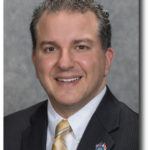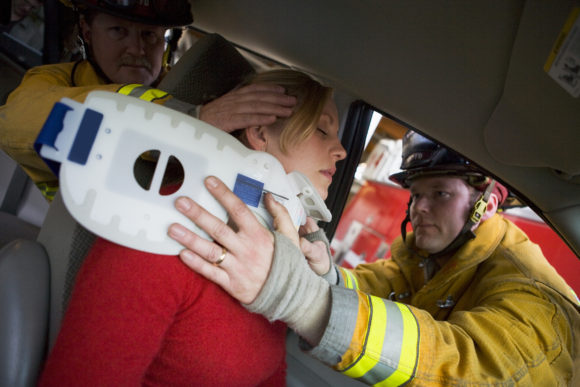Florida’s chief financial officer has stepped into the middle of a firefighters’ workers’ compensation appeal on a mental stress claim, a move the fireman’s lawyer called “unprecedented” and which reflects the importance of the case.
If Florida’s 1st District Court of Appeals upholds a judge of compensation claims ruling in the case, it could block post-traumatic stress disorder treatment and time off for many fire, police and rescue workers, CFO Jimmy Patronis and claimants’ attorney Geoff Bichler said.
“It could create a horrible, chilling effect on PTSD claims,” said Bichler, attorney for the claimant in the case, now-retired Brevard County firefighter Roger Williams.
“This case is especially important, as the 1st DCA has an opportunity to set a legal precedent of support for our brave firefighters statewide,” Patronis, who is also the state fire marshal, said in a statement this week after his office filed an amicus curiae brief in the Williams appeal. “PTSD is a serious challenge for many of our first responders, as they see and deal with unthinkable things in the line of duty.”

The point of contention in the Williams case appears to stem from the fact that Florida has two statutes that speak to mental stress benefits for responders: One has been in place since 2007 and allows only medical benefits for PTSD that is not accompanied by a physical injury.
A 2018 law that Patronis lobbied hard for was passed after the Pulse nightclub and Parkland high school mass shootings. It provides medical and indemnity benefits for mental stress, even without an accompanying physical injury. But it also requires claimants to meet strict criteria and to show convincing evidence of the mental trauma.
Bichler and Patronis’ Department of Financial Services argue that the compensation judge, Michael Ring, applied the wrong statute, potentially establishing a detrimental precedent for first responders who need professional help.
A second, very similar case, Jerome Patterson vs. City of Jacksonville, also is pending before the 1st DCA. If the appeals court agrees that the firefighters in those cases are not due benefits, firefighters around the state may ask the Legislature to clarify the law, Bichler said.
About 11 PTSD claims filed under the 2018 statue have been adjudicated, with only three of those granting benefits, according to a search of the Florida Office of Judges of Compensation Claims orders.
This question in the Williams case has not been tested at the appeal court level until now.
The circumstances of the Williams case, as spelled out in the court file, reflect the searing events that first responders often witness and the emotional toll those images can take. The case file also shows how emotional issues outside of the workplace can contribute to rescue workers’ mental health, perhaps to the detriment of their comp claims.

Roger Williams had been a firefighter with the Brevard County Fire Rescue since 1999. He had worked numerous, gruesome incidents, including a 19-year-old that had committed suicide with a shotgun; a 3-year-old killed by a car; a child with an amputated arm; and two people murdered with a hammer.
But two incidents, in particular, led to the 2021 compensation claim, the comp judge explained. Williams responded to a truck fire in 2019. He could hear the driver screaming but could not reach the man due to the flames and an exploding gas tank. Some 18 months later, Williams said he snapped when was working light duty at the fire station and saw a video on the station TV monitor, showing fire-rescue scenes. The station also had photographs of fire scenes on the wall.
The fireman said he began feeling shortness of breath, then broke down crying. He also testified he had felt anxiety before his wedding day because of the size of the crowd, and in 2021 cried for hours after having drinks at a bar, the judge recounted.
Williams’ initial petition for benefits requested indemnity as well as medical benefits, but, importantly, the indemnity request was later dropped. The county and its insurance claims administrator, Preferred Governmental Claims Solutions, denied the claim, arguing that the stress was not related to Williams’ employment.
Both sides brought in psychiatrists who examined Williams, his history of treatment and his family history. Williams’ doctor said that the truck fire and seeing the fire-scene videos at the fire house contributed to the man’s trauma. But, the doctor acknowledged, the videos and photos, which immediately preceded the comp claim, did not appear to meet the exacting criteria required by the 2018 Florida statute. The comp judge agreed.
Those criteria, criticized by some mental health professionals as arbitrary and confusing, include “directly witnessing a death … that involved grievous bodily harm of a nature that shocks the conscience.”
The 2018 PTSD statute also requires that a mental injury must be demonstrated by “clear and convincing evidence.” Another psychiatrist testified that Williams did not meet the established medical criteria for PTSD.
In the end, Judge Ring decided that the 2018 statute applies. “I find that claimant has failed to produce clear and convincing evidence that he suffered a mental or nervous injury as a manifestation of a compensable accident as is required” by law. Ring denied the claim and the request for attorney’s fees for Williams’ lawyers.
Patronis’ amicus brief, written by DFS counsel Cassidy Perdue and Katie Privett, argues that the judge got it all wrong. In claims in which only medical benefits are requested, 2007’s Section 112.1815(2)(a) of state law applies, not the 2018 section known as 112.1815(5)(a), the brief contends.
“The judge of compensation claims erroneously concluded that section 112.1815(5)(a), Florida Statutes, governs the compensability of all PTSD claims for first responders,” the DFS lawyers wrote. “This conclusion is contrary to the plain and unambiguous language of the statute and ignores the Legislature’s intent to increase coverage for mental or nervous injuries suffered by first responders.”
The 2007 law does not require the higher burden of proof and “convincing evidence” when a claimant seeks only medical benefits for a mental injury, the brief noted.
Attorneys for Brevard County and Preferred Governmental Claims could not be reached Tuesday for comment on the case.
It’s unclear how much sway the DFS amicus brief will have with the appeals court, or how likely it is that the judges will look favorably on the firefighters’ claims. One Florida judge not associated with the case said Tuesday that, because Patronis does not often get involved in cases, and because the amicus brief is clear and well-written, it could have an impact. The Department of Financial Services also houses the state Office of Insurance Regulation and its Division of Workers’ Compensation.
In an editorial posted a week ago, though, the South Florida Sun Sentinel newspaper blasted the 1st DCA for its ruling on another first responder’s workers’ compensation claim. In Stephen Sargent vs. Bradford County, the 1st DCA affirmed a compensation judge’s decision that a sheriff’s deputy was not due benefits after he suffered a heart attack.

The state’s “heart-lung law” creates a presumption that heart attacks for law officers are work-related, in most cases. But the court noted that Sargent had not undergone a physical examination when he was promoted from part-time to full-time, even though he had had one years before at the sheriff’s office, and a second physical was not required by the employer.
The judges may have been following the letter of the law, but the newspaper called the ruling “cruel as cruel could get.”
The dissenting opinion by Judge Scott Makar can be seen here.
Topics Florida
Was this article valuable?
Here are more articles you may enjoy.



 What Analysts Are Saying About the 2026 P/C Insurance Market
What Analysts Are Saying About the 2026 P/C Insurance Market  Judge Awards Applied Systems Preliminary Injunction Against Comulate
Judge Awards Applied Systems Preliminary Injunction Against Comulate  AIG’s Zaffino: Outcomes From AI Use Went From ‘Aspirational’ to ‘Beyond Expectations’
AIG’s Zaffino: Outcomes From AI Use Went From ‘Aspirational’ to ‘Beyond Expectations’  Trump’s EPA Rollbacks Will Reverberate for ‘Decades’
Trump’s EPA Rollbacks Will Reverberate for ‘Decades’ 


